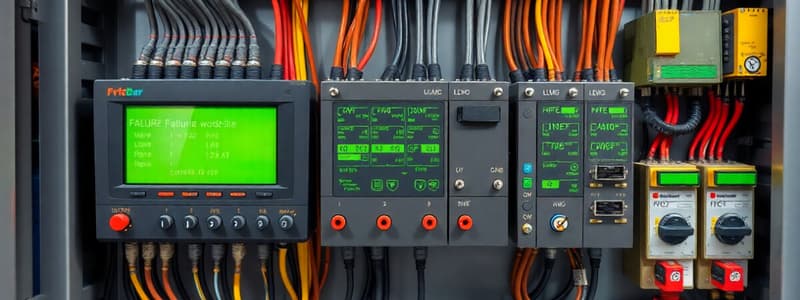Podcast
Questions and Answers
Which of the following is a common electrical failure mode?
Which of the following is a common electrical failure mode?
- Temperature fluctuation
- Coil Failure
- Short circuit of outputs (correct)
- Seal Failure
What might occur due to a loss of PES/PLC memory?
What might occur due to a loss of PES/PLC memory?
- Noise interference
- Loss of safety functions (correct)
- Fluid leaks
- Diminished response time
Which of the following pneumatic failure modes refers to contamination from the surroundings?
Which of the following pneumatic failure modes refers to contamination from the surroundings?
- Temperature
- Ingress of contaminants (correct)
- Moisture
- Line blockage
What is a potential result of valve element position failure in fluid power systems?
What is a potential result of valve element position failure in fluid power systems?
Which failure mode is characterized by a complete loss of hydraulic power?
Which failure mode is characterized by a complete loss of hydraulic power?
What is a consequence of temperature variation in pneumatic systems?
What is a consequence of temperature variation in pneumatic systems?
Which fault could result from external signal errors in electrical systems?
Which fault could result from external signal errors in electrical systems?
Which of the following represents a potential cause of coil failure in fluid power systems?
Which of the following represents a potential cause of coil failure in fluid power systems?
Which of the following is the first step in the risk assessment process?
Which of the following is the first step in the risk assessment process?
What determines the level of risk in a risk scoring system?
What determines the level of risk in a risk scoring system?
What is the purpose of identifying risk reduction measures?
What is the purpose of identifying risk reduction measures?
Which term describes a part of a machine that includes safety-related functions?
Which term describes a part of a machine that includes safety-related functions?
When assessing initial risk, which scoring combination results in a 'High' risk level?
When assessing initial risk, which scoring combination results in a 'High' risk level?
What is the next step after assessing residual risk?
What is the next step after assessing residual risk?
Which of the following probabilities corresponds with a 'Negligible' risk level for severity classified as 'Minor'?
Which of the following probabilities corresponds with a 'Negligible' risk level for severity classified as 'Minor'?
What is the final step of the risk assessment process as described?
What is the final step of the risk assessment process as described?
Which step involves determining failure modes and considerations?
Which step involves determining failure modes and considerations?
What is the first action to take when risk is not acceptable?
What is the first action to take when risk is not acceptable?
What is the first step in machinery safety?
What is the first step in machinery safety?
Is fixed guarding part of the safety related part of a control system?
Is fixed guarding part of the safety related part of a control system?
A safety function applies to which of the following?
A safety function applies to which of the following?
What should be evaluated to ascertain how much risk is reduced by the SRP/CS?
What should be evaluated to ascertain how much risk is reduced by the SRP/CS?
Which step involves defining safety functions for the system?
Which step involves defining safety functions for the system?
What aspect should be determined to define the required reliability design specification?
What aspect should be determined to define the required reliability design specification?
Which of the following is NOT a step in determining required reliability?
Which of the following is NOT a step in determining required reliability?
What is included in the basic elements required for a safety function?
What is included in the basic elements required for a safety function?
Monitoring and diagnostic coverage are applied to manage which aspect?
Monitoring and diagnostic coverage are applied to manage which aspect?
Which step outlines the application of specific design requirements and examples?
Which step outlines the application of specific design requirements and examples?
What is required for selecting a reliability design specification for a circuit?
What is required for selecting a reliability design specification for a circuit?
Which of the following methodologies is NOT mentioned for reliability design specification?
Which of the following methodologies is NOT mentioned for reliability design specification?
What does the term 'Residual Risk' refer to in the context of risk reduction measures?
What does the term 'Residual Risk' refer to in the context of risk reduction measures?
What is the main focus of the reliability design specifications discussed?
What is the main focus of the reliability design specifications discussed?
Which statement is true regarding control reliability ratings in the context provided?
Which statement is true regarding control reliability ratings in the context provided?
What is the acceptable risk level in relation to initial risk?
What is the acceptable risk level in relation to initial risk?
Which of the following best describes 'Zero Risk'?
Which of the following best describes 'Zero Risk'?
Which is an example of a risk reduction measure mentioned?
Which is an example of a risk reduction measure mentioned?
What is the first step in the functional safety process?
What is the first step in the functional safety process?
Which of the following is NOT considered a fault exclusion basis?
Which of the following is NOT considered a fault exclusion basis?
What must be defined for each safety function to ensure reliability?
What must be defined for each safety function to ensure reliability?
In the functional safety process, when are the failure modes of circuit devices evaluated?
In the functional safety process, when are the failure modes of circuit devices evaluated?
What type of coverage is to be determined as part of the functional safety process?
What type of coverage is to be determined as part of the functional safety process?
Which step involves defining the basic input, logic, and output elements required?
Which step involves defining the basic input, logic, and output elements required?
At which stage in the functional safety process is risk reduction measures specifically involving the SRP/CS identified?
At which stage in the functional safety process is risk reduction measures specifically involving the SRP/CS identified?
Which of the following actions is carried out to manage failure modes during design?
Which of the following actions is carried out to manage failure modes during design?
What may limit the ability to detect certain faults during operation?
What may limit the ability to detect certain faults during operation?
Which stage evaluates the effectiveness of the entire safety system?
Which stage evaluates the effectiveness of the entire safety system?
Flashcards are hidden until you start studying
Study Notes
Electrical Failure Modes
- Short circuit can occur in outputs, external wiring, or actuators, causing loss of switching function.
- PES/PLC program alterations due to unsecured logic or programming errors can lead to malfunctions.
- Loss of PES/PLC memory poses significant risks to system operation.
- Safety device failures may result from issues with internal components.
- False actuator/input signals can result from noise or external signal errors, leading to improper system responses.
Fluid Power Failure Modes
- Seal failure can lead to leakage and loss of hydraulic fluid.
- Spring or coil failure impacts the mechanical actuation within systems.
- Loss of electrical power can be complete or partial, affecting system operation.
- Diminished response time and valve position failures can create inefficiencies and safety hazards.
- Pilot section or mounting orientation failures influence system stability and functioning.
- Inertial forces and connector failures (hoses/tubes) can restrict fluid flow.
Pneumatic Failure Modes
- Adverse temperature and moisture levels can damage pneumatic systems.
- Electrical issues may lead to control failures.
- Lack of lubrication contributes to increased friction and wear.
- Line blockages or muffler restrictions impede airflow.
- Ingress of contaminants can degrade system performance.
Hydraulic Failure Modes
- Closed hydraulic systems need to manage wear as contaminants can amplify failure rates.
- Essential to monitor temperature, moisture, and air levels to ensure system integrity.
- Particle contamination poses significant risks to fluid power operation.
Risk Assessment Process
- Start with a risk scoring system to evaluate severity and probability of occurrence.
- Implement a hazard control hierarchy to reduce risks effectively.
- Document assessment outcomes for future reference.
Scoring Systems
- Risk assessment evaluates severity of harm against the likelihood of occurrence.
- Categories include catastrophic, serious, moderate, and minor outcomes linked to the probability of occurrence (very likely, likely, unlikely, remote).
Safety-Related Control Systems (SRP/CS)
- Conduct thorough risk assessments to identify safety functions and reliability specifications.
- Utilize SRP/CS to define critical safety functions and their corresponding reliability requirements.
- Implement design requirements for all elements of a control system.
Reliability Specifications
- Establish reliability design specifications based on ISO standards (e.g., ISO 13849-1).
- Control reliability ratings cannot solely dictate overall circuit reliability; individual component ratings are insufficient.
- Include fault consideration as part of the design process to enhance circuit reliability.
Functional Safety Process
- Conduct assessments and identify risk reduction measures related to SRP/CS.
- Define essential safety functions and requisite reliability for each function.
- Evaluate the effectiveness of the safety system continuously to ensure compliance and safety.
Fault Exclusion
- Certain faults may not be detected during operation, emphasizing the need for effective design and installation to minimize occurrence.
- Low probability of certain faults can justify exclusion based on established engineering practices and application-specific technical requirements.
- Evaluate failure modes continually to maintain the integrity of devices, actuators, and controllers.
Studying That Suits You
Use AI to generate personalized quizzes and flashcards to suit your learning preferences.




